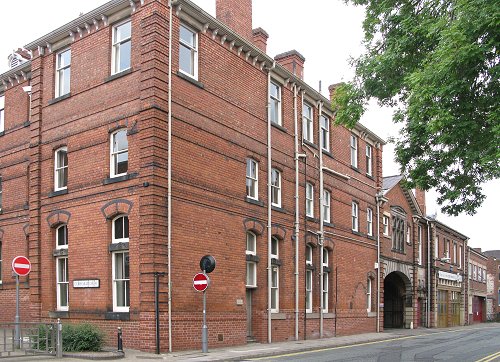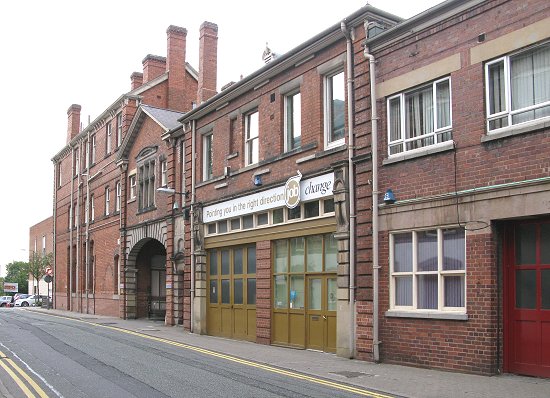|
More
Promotion
Joe was soon chosen for promotion
to inspector, and was sent on a training course to the
police college at Bramshill House in
Hampshire. This is what he had to say about it:
“I worked in the driving school for
about 12 months, which wasn’t long. I was then selected
to go to police college for further training. You went
to police college if you were a sergeant and getting
near to being promoted to inspector. The college would
broaden your outlook, it was as much academic as law. I
got selected to go to Bramshill and knew I was in line
for promotion to inspector. I did six months there and
handed the driving school to another chap, Norman
Horobin. |
|

Red Lion Street Police Station. |
I came back thinking I was going to
return to the driving school, but when I got back he
called me in and said “I’ve had very good reports from
the college. I’ve an indication that Inspector Rose is
retiring in about two months time, and I’ll tell you now
that you will be promoted on the day he retires.”
That
was unusual, very unusual so far in advance. He said “In
view of this it might be wise for you to go back on the
street, and get back to the everyday life of a foot
patrol sergeant because you will be a foot patrol
inspector.” |
|
Joe became an inspector in 1963,
and continued in the same roll until about 18 months
later when the 1966 amalgamation of the local police
forces had started to take shape. In 1960 a Royal
Commission had been appointed to look into many aspects
of policing. One of its recommendations was that smaller
police forces should be amalgamated. This resulted in
the formation of West Midlands Constabulary, on the 1st
of April, 1966. It was formed by merging Dudley Borough
Police, Walsall Borough Police, Wolverhampton Borough
Police and parts of Staffordshire and Worcestershire
Constabularies. When the plans for the merger were
taking shape, Joe was made a temporary chief inspector,
with the responsibility of forming the traffic division
of the new force. Joe was delighted and described his
good luck as follows:
“I was lucky, I couldn’t believe
it. If you were made a temporary officer, it would be
permanent, they never sent anyone from temporary back to
their old rank. So I knew I was going to be a chief
inspector. On the 1st of April, 1966 I was made
substantive, and took charge of the traffic division for
the Black Country.
I had to be interviewed by the
promotion board for the job because it had to be
advertised within the force. I was asked to take the
post which was based at Brierley Hill. You used to have
to move to the town you were serving, you had to live on
your division. But because this was the headquarters of
the traffic division for the Black Country, I didn’t
have to move. The head of the promotion board, Mr.
Goodchild said “There’s only one problem Davies, a
language problem, you’ll have a great deal of difficulty
understanding them at Brierley Hill!” I didn’t know what
to do, he looked so serious, but he was joking. I got on
all right with him because I wasn’t afraid to work.”
New
Ideas
Joe invented a group system of
policing which made the whole operation run smoothly and
more efficiently. It became a great success and was
introduced universally.
“I introduced a group system of
policing, which pleased Mr. Goodchild very much. We were
having shifts, then a day off, followed by a return to
the shift.
|
| When the inspectors and sergeants had a day
off they were replaced by someone else, who would leave
work for them on their return.
How can we keep this
together I thought? If one’s on they’re all on, so I
devised the group system.
If an inspector was on, all
his men were with him, except for annual leave, so there
was no need to move staff sideways. Mr. Goodchild liked
the idea.” |

Another view of Red Lion Street
Police Station. |
|
Joe’s new system had many benefits,
and ensured that people were available when needed.
“We had one day, a Thursday that
was spare. At the time we were having a lot of bank
robberies. They were coming in, snatching wages as they
were being delivered. I told the Chief Constable that
wages were collected on a Thursday, to be paid on a
Friday, so we had to watch premises on a Thursday night.
I mentioned that we had a group of bobbies on a full
shift who could do the banks, and could be stationed
around them to look out for the snatches, and also look
at factories where they knew there was cash. That spare
day used to be taken off, so Mr. Goodchild thought it
was marvellous how it all fitted in. He was secretary of
the Association of Chief Police Officers, and asked me
to do graphs for other forces. It was interesting, and a
little feather in my cap, and it’s still going.
Mr. Goodchild was so pleased with
it that he asked me to see someone in the borough
engineer’s department to have a proper wood panel made
that fastened to the wall. He wanted it on a roller so
that everybody could turn to a new date to see what they
were on. If I went to another force I would show them
how easily it all worked, and how it helped with court.
You could look in advance and make sure that you don’t
put them on court on a day off. You just turned your
roller. The carpenters made a lovely job of the panel, a
proper piece of furniture that hung on the wall in Red
Lion Street.” |
 |
|
 |
|
 |
|
Return to Police Driving School |
|
Return to
the contents |
|
Proceed to
Display Team |
|